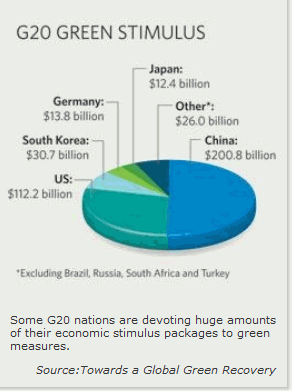|
|
|
|
|
|
|
News & Views item - April 2009 |
![]() Economic
Stimuli a Boost for Greenhouse Gas Reduction Efforts. (April 7, 2009)
Economic
Stimuli a Boost for Greenhouse Gas Reduction Efforts. (April 7, 2009)
 A forty-nine page report,
Toward a
Global Green Recovery: Recommendations for Immediate G20 Action
A forty-nine page report,
Toward a
Global Green Recovery: Recommendations for Immediate G20 Action![]() written under the auspices of the German Foreign Office by Ottmar Edenhofer,
co-chair of the Intergovernmental Panel on Climate Change (IPCC), and Nicholas
Stern, chair of the Grantham Research Institute on Climate Change and the
Environment at the London School of Economics and Political Science, sets out
what the authors consider to be key measures that must be undertaken to mitigate
the effects of excessive greenhouse gas emissions.
written under the auspices of the German Foreign Office by Ottmar Edenhofer,
co-chair of the Intergovernmental Panel on Climate Change (IPCC), and Nicholas
Stern, chair of the Grantham Research Institute on Climate Change and the
Environment at the London School of Economics and Political Science, sets out
what the authors consider to be key measures that must be undertaken to mitigate
the effects of excessive greenhouse gas emissions.
Referring to the economic stimulus packages that most G20 nation's are undertaking Edenhofer and Stern introduce their report by saying: "The need for a substantial fiscal boost in the short term provides a great opportunity to undertake projects with a high social return, at a time when inputs are relatively cheap and underutilised resources and workers are available. But additional measures should be timely, well targeted, and taken within a clear long-term framework if they are to help lay the foundations of sustainable growth in the medium and long term without threatening fiscal sustainability when recovery comes."
How many of the G20 leaders or their top advisors read, let alone digested the densely written report, is problematical; nevertheless it is not only timely but essential as part of the arsenal to gainsay the opponents of support for renewable energy production, carbon capture R&D, and efforts to obtain significant increases in efficiency in energy production.
According to NatureNews the report gives the tentative estimate that "almost US$400 billion of the total $2,610 billion in economic stimulus packages unveiled so far by the G20 nations have been earmarked for green measures such as renewable power generation, improved electricity grids and cleaner cars".
However according to consultancy McKinsey & Company that US$400 billion will need to be invested annually to set the world on a low-carbon path and it would need to outlast the current boom in public expenditure. And Professor Edenhofer warns: "Without the transition towards a low-carbon global energy system, the next economic crisis is pre-programmed."
The report also makes some cogent comparisons on just who is contributing what to the effort. It points out that China, "often perceived as the world's biggest polluter, is set to spend about US$200 billion on green stimulus in 2009 and 2010, representing 4.8% of its gross domestic product in 2008. That compares with US$112.2 billion of investment in green projects by the United States, representing 0.8% of its gross domestic product in 2008, and 11.5% of its total stimulus package. Meanwhile, South Korea plans to spend more than 80% of its $38-billion stimulus package on green measures in the next four years".
Edenhofer and Stern recommend the G20 nations focus their recovery programs on the following seven strategic areas:
Increasing energy efficiency,
Upgrading physical infrastructure,
Supporting clean technology markets,
Initiating flagship projects, e.g. large scale demonstration projects,
Enhancing international research and development,
Incentivising investment, e.g. providing strong commitments to pricing carbon across all sectors,
Coordinating G20 efforts.
And they conclude: "The current economic contraction and the growing interest of national governments in kick-starting a world-wide recovery represent an opportunity to tackle important long-run economic and environmental challenges together. Fiscal measures aimed at economic recovery and job creation can and need to be made compatible with developing a low-carbon world economy. Above, we have highlighted seven strategic areas for G20 action which, if implemented, would help to foster sustainable economic growth, create jobs and wealth, avoid dangerous climate change and reduce sources of global instability such as energy insecurity and resource competition."
However, a note of caution. While Edenhofer and Stern endorse R&D on carbon capture and Australia is injecting a substantial percentage of public funds into such work, Marian Wilkinson writing in yesterday's Sydney Morning Herald reports: "[A]t a NSW Minerals Council forum last week, CSIRO's chief of energy technology, David Brockway, explained bluntly that we are unlikely to see a commercial-scale clean coal plant operating within 15 years - or at least 2024," and "Last year, the media were lobbied heavily to promote a carbon storage project run by the gas company Santos that promised to bury 20 million tonnes of carbon dioxide a year from gas and coal operations around the country. Last month, without a whimper, Santos suspended the project, apparently because it wasn't considered economically viable."
And finally she writes: "A joint Rio Tinto-BP carbon capture project in Western Australia, also lauded in the media, fell over last year. Around the same time, the world's leading clean coal experiment, FutureGen in America, collapsed after the Bush administration slashed its commitment to the billion-dollar project. FutureGen was a favourite of the Howard government, which pledged $15 million from Australian taxpayers along with a slice of industry funds."
However, a report in the March 6, 2009 Washington Post indicates that FutureGen is in fact on "life-support". U.S. Secretary of Energy Steven Chu expressed support for continuing the project using stimulus funds (after some changes that have not yet been specified) and making it a part of a larger portfolio of research plants developed in collaboration with other countries.